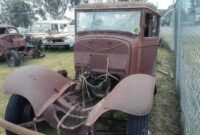Ryder Rental Trucks For Sale: Your Comprehensive Guide to Acquiring Reliable Fleet Vehicles pickup.truckstrend.com
Introduction: Unlocking Value with Ryder Rental Trucks For Sale
In the dynamic world of logistics, transportation, and small business operations, the acquisition of reliable and cost-effective commercial vehicles is paramount. While purchasing brand-new trucks often entails significant capital outlay and immediate depreciation, the market for used commercial vehicles offers a compelling alternative. Among the most reputable and sought-after sources for pre-owned trucks is Ryder System, Inc., a global leader in commercial fleet management, dedicated transportation, and supply chain solutions. When you encounter "Ryder Rental Trucks For Sale," you’re looking at an opportunity to acquire well-maintained, fleet-grade vehicles that have served their initial purpose in Ryder’s extensive rental or lease programs.
Ryder Rental Trucks For Sale: Your Comprehensive Guide to Acquiring Reliable Fleet Vehicles
Ryder’s business model revolves around maximizing the uptime and efficiency of its vast fleet. This commitment translates directly into a rigorous maintenance schedule and a robust disposition process for their vehicles. Consequently, buying a used Ryder truck isn’t just about saving money; it’s about investing in a vehicle with a documented service history, professional upkeep, and a proven track record. This comprehensive guide will navigate the intricacies of purchasing Ryder rental trucks, offering insights, practical advice, and a detailed look into what makes these vehicles a smart choice for a diverse range of buyers, from independent owner-operators to growing enterprises looking to expand their fleet economically.
I. Why Choose a Used Ryder Truck? The Value Proposition
The decision to buy a used commercial truck, especially from a reputable source like Ryder, hinges on several compelling advantages that extend far beyond initial cost savings.
- Cost-Effectiveness: This is perhaps the most immediate benefit. Used trucks are significantly less expensive than their new counterparts, allowing businesses to free up capital for other investments or to acquire a larger fleet for the same budget. The steepest depreciation occurs in the first few years, meaning you avoid this significant loss by buying used.
- Proven Reliability and Maintenance: Ryder’s entire business relies on keeping its fleet operational. This necessitates a stringent preventative maintenance program, regular inspections, and professional repairs conducted by certified technicians. Every truck in Ryder’s fleet undergoes routine servicing according to manufacturer specifications and often exceeds them. While used, these trucks have typically been cared for to a higher standard than many individually owned vehicles.
- Wide Selection and Availability: Ryder maintains one of the largest commercial truck fleets in North America. This scale means a continuous turnover of vehicles, resulting in a vast and diverse inventory of trucks for sale. Buyers can find various makes, models, sizes, and configurations – from light-duty box trucks to heavy-duty tractor-trailers – often immediately available.
- Immediate Availability: Unlike ordering a new truck, which can involve lead times of several months or even over a year due to manufacturing backlogs, used Ryder trucks are typically available for immediate purchase and deployment, allowing businesses to respond quickly to market demands.
- Transparent Vehicle History: Ryder typically provides comprehensive maintenance records for their vehicles. This transparency allows buyers to review the truck’s service history, understand the repairs performed, and gain confidence in its condition.
- No Hidden Agendas: Ryder’s primary business is fleet management and rentals, not selling used trucks. Their sales division is designed to efficiently move retired assets, not to engage in high-pressure sales tactics. This often translates into a more straightforward and professional buying experience.

II. Types of Ryder Trucks Commonly For Sale
Ryder’s vast fleet encompasses a wide array of commercial vehicles, catering to nearly every transportation need. When browsing Ryder Rental Trucks For Sale, you’ll encounter a diverse inventory, typically including:
- Box Trucks (Straight Trucks): These are perhaps the most common. Available in various lengths (e.g., 16-foot, 24-foot, 26-foot), they are ideal for local deliveries, moving services, and general freight. You’ll find models from manufacturers like Isuzu, Hino, Freightliner, International, Ford, and GMC.
- Tractor Trailers (Semi-Trucks):
- Day Cabs: Designed for local or regional hauling where drivers return home daily. Brands include Freightliner, International, Volvo, Kenworth, and Peterbilt.
- Sleeper Cabs: Equipped with sleeping quarters for long-haul operations. Less common in the "rental" fleet, but sometimes available from their lease portfolio.
- Flatbed Trucks: Used for transporting oversized, oddly shaped, or palletized goods that require top loading. These often come in various lengths and weight capacities.
- Refrigerated Trucks (Reefers): Essential for transporting perishable goods, these trucks feature insulated cargo areas and refrigeration units. Available in box truck and sometimes tractor-trailer configurations.
- Stake Bed Trucks: Similar to flatbeds but with removable stakes or panels around the perimeter, offering versatility for securing various types of cargo while allowing for side loading.
- Vans:
- Cargo Vans: Smaller, enclosed vans suitable for lighter loads, urban deliveries, and service businesses. Ford Transit, Ram ProMaster, and Mercedes-Benz Sprinter models are common.
- Sprinter-style Vans: Often used for expedited freight or last-mile delivery, offering good fuel efficiency and maneuverability.
Each vehicle type will come with varying specifications, engine types (diesel or gasoline), transmission types (manual or automatic), and mileage, impacting its suitability for specific applications and, of course, its price.
III. The Ryder Used Vehicle Sales Process: How to Buy
Purchasing a used Ryder truck is a streamlined process, largely facilitated by their dedicated sales infrastructure.
- Online Portal: The primary gateway is Ryder’s official used vehicle sales website, RyderUsedTrucks.com. This user-friendly platform allows you to browse their entire available inventory.
- Search and Filter: Utilize the comprehensive search filters to narrow down your options. You can filter by:
- Vehicle Type: (e.g., box truck, tractor, van)
- Location: Find trucks near you to minimize travel for inspection.
- Price Range: Stick to your budget.
- Mileage: Consider your desired age/wear.
- Make/Model: If you have a preference.
- Features: (e.g., liftgate, sleeper, refrigeration unit)
- View Inventory and Specifications: Each listing provides detailed information, including multiple photos, key specifications (engine, transmission, GVWR), odometer reading, VIN, and often a link to view maintenance records.
- Contact Sales Representatives: Once you’ve identified a truck of interest, you can contact the listed sales representative directly via phone or email. They can provide more information, answer specific questions, and arrange for a physical inspection.
- Physical Inspection: This is a crucial step. While Ryder maintains its vehicles well, a personal inspection is vital. If possible, bring a trusted mechanic who specializes in commercial vehicles to conduct a pre-purchase inspection (PPI). Check the engine, transmission, brakes, tires, suspension, frame, and all operational systems. Don’t forget the interior and exterior for signs of significant wear or damage.
- Financing Options: Ryder often offers competitive financing options through Ryder Financial Services for qualified buyers. Alternatively, you can secure financing through your bank or a third-party commercial vehicle lender.
- Warranty Considerations: Many Ryder used trucks come with a limited powertrain warranty from Ryder. The specifics vary based on the truck’s age and mileage, so be sure to understand what is covered and for how long. Extended warranties may also be available for purchase.
- Paperwork and Closing: Once you’ve made your decision, the sales representative will guide you through the necessary paperwork, including the bill of sale, title transfer, and any financing documents. Ensure all terms are clear before signing.
IV. Important Considerations Before You Buy
A successful purchase requires due diligence. Here’s what to keep in mind:
- Vehicle History and Maintenance Records: Ryder’s strength lies in its comprehensive maintenance programs. Request and thoroughly review the maintenance history. This will show you exactly what services have been performed, when, and by whom, giving you an unparalleled insight into the truck’s past.
- Condition Assessment: Don’t just look at the pictures. A physical inspection is paramount.
- Engine & Drivetrain: Check for leaks, unusual noises, smoke from the exhaust, and smooth shifting.
- Tires & Brakes: Assess tire tread depth and condition. Inspect brake pads, rotors, and air lines.
- Suspension & Steering: Look for worn components, leaks in air suspension systems, and excessive play in the steering.
- Frame & Body: Check for rust, cracks, accident damage, and previous repairs.
- Interior & Electrical: Test all lights, gauges, HVAC, and power accessories.
- Mileage vs. Age: A high-mileage truck that has been meticulously maintained can be a better buy than a lower-mileage truck that has been neglected. Ryder trucks often have higher mileage due to their intensive use, but their maintenance mitigates much of the associated risk. Balance these factors with your expected lifespan for the vehicle.
- Intended Use: Match the truck’s specifications (GVWR, engine power, cargo capacity, reefer unit size) precisely to your business needs. Overloading or underpowering can lead to costly issues.
- Operating Costs: Factor in potential ongoing costs like fuel efficiency (which varies significantly by engine type and age), insurance, and future maintenance expenses. While used trucks are cheaper to buy, they might not be as fuel-efficient or have as low maintenance costs as a brand-new model.
- Regulatory Compliance: Understand the specific regulations for commercial vehicles in your region, including DOT inspections, CDL requirements, and emissions standards. Ensure the truck meets these requirements.
V. Tips for a Successful Purchase
- Set a Clear Budget: Include not only the purchase price but also estimated costs for inspection, potential immediate repairs, registration, insurance, and any necessary upgrades.
- Do Your Research: Compare prices for similar trucks from other sellers (dealerships, private sellers) to ensure Ryder’s pricing is competitive.
- Don’t Skip the Independent Inspection: This cannot be stressed enough. A third-party mechanic provides an unbiased assessment and can identify issues you might miss.
- Understand the Warranty: Read the warranty terms carefully. Know what’s covered, for how long, and what voids the warranty.
- Be Prepared to Act: Desirable trucks, especially those priced competitively, tend to sell quickly. If you find a truck that fits your needs and passes inspection, be ready to move forward.
VI. Potential Challenges and Solutions
While buying a used Ryder truck is generally a positive experience, it’s wise to be aware of potential challenges:
- Challenge: High Mileage: Many Ryder trucks are retired after accumulating significant mileage.
- Solution: Focus on the quality of the mileage. Ryder’s robust maintenance means high mileage often comes with a well-documented service history. A high-mileage Ryder truck with excellent records can be more reliable than a lower-mileage truck with an unknown past. Prioritize a thorough pre-purchase inspection.
- Challenge: Cosmetic Wear and Tear: As rental vehicles, they often show more interior and exterior wear (scratches, dings, seat tears) than a privately owned truck.
- Solution: Evaluate if cosmetic issues impact functionality. Minor cosmetic flaws are usually acceptable and can be easily addressed with detailing or inexpensive repairs, which might be offset by the lower purchase price.
- Challenge: Limited Warranty: Used trucks, including Ryder’s, come with more limited warranties compared to new vehicles.
- Solution: Understand the exact terms of Ryder’s limited warranty. Consider purchasing an extended warranty if available and if it provides sufficient coverage for your peace of mind. Allocate a budget for potential future repairs.
- Challenge: Specific Model Availability: While Ryder has a large fleet, a very specific make, model, or configuration might not be immediately available.
- Solution: Utilize the "Notify Me" or "Alerts" feature on Ryder’s website if available, or regularly check their inventory. Be flexible with your requirements if possible.
VII. Ryder Rental Trucks For Sale: Estimated Price Guide
Please note that the prices for Ryder rental trucks for sale are highly variable and depend on numerous factors including: year of manufacture, exact make and model, engine type, mileage, overall condition, specific features (e.g., liftgate, reefer unit), and geographical location. The table below provides estimated ranges and should be used as a general guide only. Always check the current inventory on RyderUsedTrucks.com for the most accurate and up-to-date pricing.
| Truck Type | Typical Years Available | Average Mileage Range (miles) | Estimated Price Range (USD) | Key Features/Notes |
|---|---|---|---|---|
| Cargo Van | 2018 – 2022 | 80,000 – 180,000 | $15,000 – $35,000 | Ford Transit, Ram ProMaster, Mercedes-Benz Sprinter. Ideal for last-mile delivery, service, or small business. |
| 16-Foot Box Truck | 2017 – 2021 | 100,000 – 250,000 | $20,000 – $45,000 | Isuzu, Hino, Ford, GMC. Often includes roll-up door, some with liftgates. Suitable for local moving/delivery. |
| 24-Foot Box Truck | 2016 – 2020 | 150,000 – 300,000 | $25,000 – $55,000 | Freightliner, International, Hino. Standard for medium-duty freight, often with liftgates. |
| 26-Foot Box Truck | 2016 – 2020 | 150,000 – 350,000 | $30,000 – $65,000 | Freightliner, International. Max capacity for straight trucks, often with liftgates. Common for furniture, general cargo. |
| Refrigerated Box Truck | 2015 – 2019 | 180,000 – 350,000 | $40,000 – $80,000+ | Requires specialized reefer unit. Price highly dependent on unit condition and truck size. |
| Day Cab Tractor | 2014 – 2018 | 400,000 – 700,000 | $35,000 – $85,000+ | Freightliner Cascadia, International LT/ProStar, Volvo VNL. Used for local/regional hauling. Manual or automatic. |
| Sleeper Cab Tractor | 2013 – 2017 | 500,000 – 800,000+ | $45,000 – $100,000+ | Less common from rental fleet, more from lease. Price varies significantly by spec and condition. |
| Flatbed Truck | 2015 – 2019 | 150,000 – 300,000 | $30,000 – $60,000 | Various sizes and weight capacities. Good for construction, materials transport. |
Disclaimer: These prices are estimates only and are subject to change based on market conditions, specific vehicle attributes, and location. Always verify current pricing directly with Ryder.
VIII. Frequently Asked Questions (FAQ) about Ryder Rental Trucks For Sale
Q1: Are Ryder trucks reliable despite being used?
A1: Yes, Ryder trucks are generally considered reliable. They undergo strict preventative maintenance schedules and professional repairs throughout their service life, often exceeding typical industry standards for used vehicles.
Q2: Can I get a warranty with a used Ryder truck?
A2: Many Ryder used trucks come with a limited powertrain warranty from Ryder. The exact terms (duration, mileage, coverage) vary based on the truck’s age and mileage. It’s crucial to confirm warranty details for each specific vehicle. Extended warranties may also be available for purchase.
Q3: What’s the typical mileage on a Ryder truck for sale?
A3: Ryder trucks are workhorses, so they often have higher mileage (e.g., 100,000 to 300,000+ miles for box trucks, 400,000 to 700,000+ miles for tractors) when they are put up for sale. However, their comprehensive maintenance programs mean this mileage is often "well-earned" and documented.
Q4: How do I inspect a used Ryder truck before buying?
A4: Schedule a physical inspection. It’s highly recommended to bring an independent, qualified commercial truck mechanic to perform a pre-purchase inspection (PPI). They can thoroughly check the engine, transmission, brakes, tires, suspension, frame, electrical systems, and overall condition.
Q5: Does Ryder offer financing for used truck purchases?
A5: Yes, Ryder Financial Services often provides competitive financing options for qualified buyers. You can inquire about their financing programs directly with the sales representative.
Q6: Are prices negotiable for Ryder used trucks?
A6: While Ryder aims for competitive and fair pricing, there might be some limited room for negotiation, especially on older or higher-mileage units. However, given the high demand and standardized sales process, don’t expect significant price drops. Focus on getting a good value for a well-maintained truck.
Q7: Where can I see Ryder trucks for sale?
A7: The primary place to view their inventory is their official website, RyderUsedTrucks.com. You can filter by location to find trucks available at Ryder sales centers or rental locations near you for physical inspection.
Q8: Do Ryder trucks come with maintenance records?
A8: Yes, one of the significant advantages of buying from Ryder is the availability of detailed maintenance records. These records provide a transparent history of all services, inspections, and repairs performed on the vehicle, offering valuable insight into its past care.
Conclusion: Your Smart Investment in a Ryder Rental Truck
The market for Ryder Rental Trucks For Sale represents a compelling opportunity for businesses and individuals seeking reliable, well-maintained commercial vehicles without the prohibitive cost of new equipment. By understanding the value proposition – including cost-effectiveness, proven maintenance, and diverse inventory – and by following a diligent buying process that emphasizes thorough inspection and informed decision-making, buyers can secure a valuable asset.
While the high mileage on some units might initially raise concerns, Ryder’s commitment to fleet uptime and rigorous preventative maintenance protocols significantly mitigate these risks. The transparent availability of maintenance records provides an invaluable layer of confidence, allowing buyers to see the meticulous care these vehicles have received. By leveraging Ryder’s established sales network, utilizing their online tools, and performing necessary due diligence, you can confidently acquire a truck that is ready to hit the road and contribute effectively to your operational needs. Investing in a used Ryder truck isn’t just a purchase; it’s a strategic move towards sustainable growth and efficiency in your transportation endeavors.


